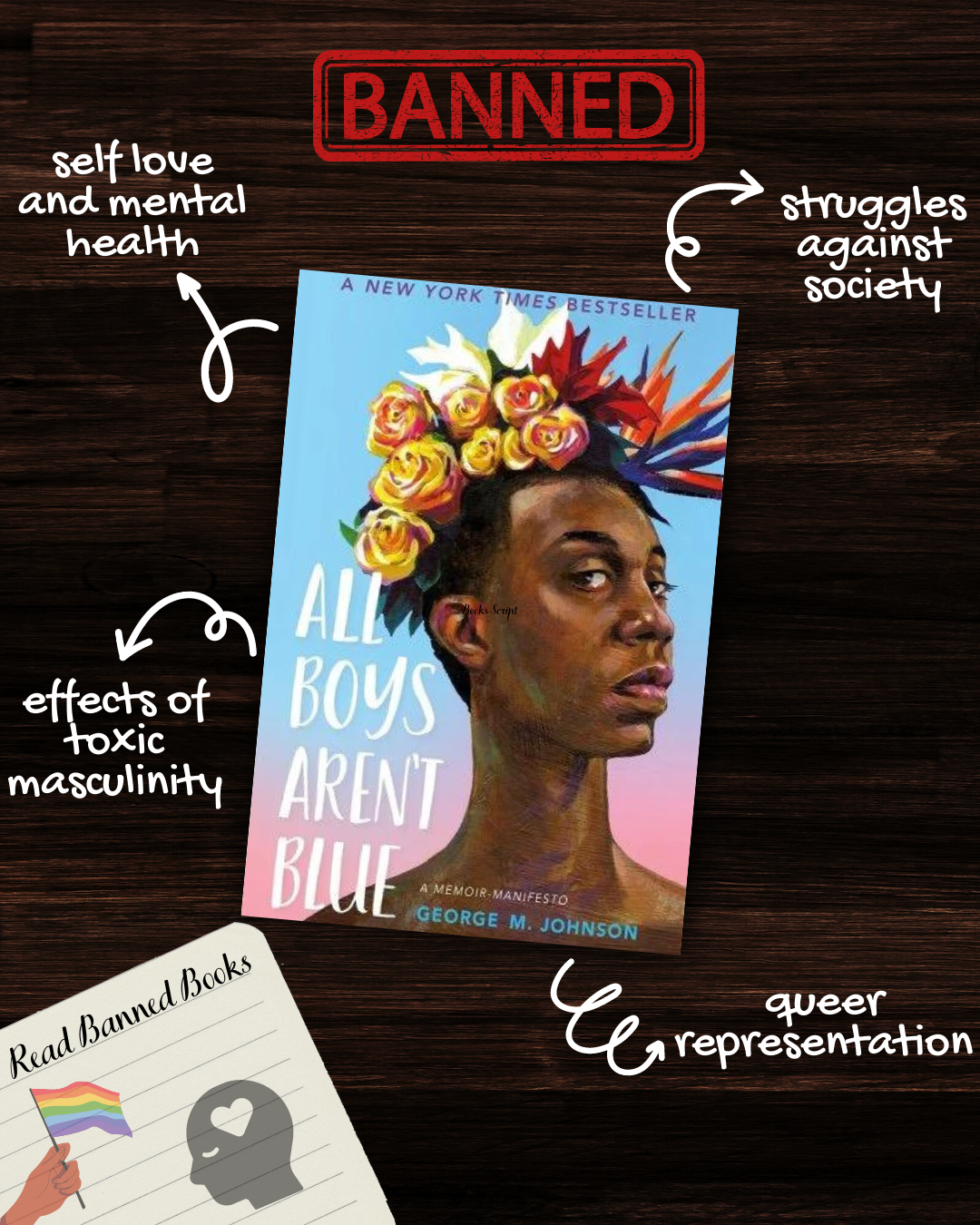Welcome!
This post contains affiliate links for which I may receive compensation. You can click here to read my full FTC Affiliate Disclosure policy.
Banned Book Review: All Boys Aren’t Blue

Rating: ![]()
Age Rating: 14+
As the issue of book banning gained attention, I took the opportunity to read All Boys Aren’t Blue by George M. Johnson. This book is a memoir that has recently been the target of censorship. This book courageously explores themes of queerness, race, and masculinity, creating a powerful narrative about personal identity in the face of societal pressure.
Johnson’s writing is a compelling blend of openness and strength, leading readers through a significant journey of self-discovery and acceptance. Despite the controversy and attempts to silence it, this book underlines the need for varied perspectives in literature. As we grapple with these topics, it becomes increasingly crucial to promote suppressed voices.
Please pick up a copy of All Boys Aren’t Blue and join me in recognizing the importance of diverse storytelling. Let’s pledge to support the inclusion of varied narratives and freedom of expression, reminding ourselves that every voice and story has its value.
Synopsis
All Boys Aren’t Blue by George M. Johnson is a strong memoir that gives a voice to the often unseen experiences of queer Black young men. Through deeply personal essays, Johnson guides readers through his life — from his early years in New Jersey to his time in college in Virginia — revealing the obstacles and victories he encountered due to his identity.
His writing, both intensely heartfelt and truthfully raw, deals with essential topics like gender identity, harmful masculinity, brotherhood, family, and consent. It also highlights the power of joy within the Black community and the resilience of queer individuals of color. Despite sharing painful experiences like confronting bullies and societal exclusion, Johnson’s story stands firmly in hope, strength, and authentic living.
This memoir acts as a beacon for young queer men of color and an essential guide for those who wish to understand and support them. It bravely promotes understanding of the history, language, and actions required to build a world without oppression, fostering acceptance.
All Boys Aren’t Blue is a deeply personal, brave, and important story that shines a light on the realities of growing up Black and queer in the present day. It fills the representation gap in literature, asserting that such narratives must be told by the people who have lived them.
All Boys Aren’t Blue Controversy
All Boys Aren’t Blue by George M. Johnson has become a topic of discussion as it’s been banned in many U.S. school libraries due to its explicit language, sexual content, and discussions around sensitive issues like racism and violence. However, it’s crucial to understand that these are the realities that numerous young people are dealing with today and deserve to see reflected in literature. Johnson’s memoir presents an honest and insightful look into these experiences that can broaden many readers’ perspectives.
George M. Johnson, a Black queer activist and journalist, offers a unique, impactful, and much-needed voice to the world of literature. His work is especially significant for young Black LGBTQ+ readers who have long awaited greater representation in literature.
All Boys Aren’t Blue introduces us to Johnson’s personal experiences with racism, homophobia, and destructive masculinity—topics often neglected in mainstream stories. Johnson’s openness not only offers a guiding light for marginalized communities but also unveils the deeply rooted societal prejudices and behaviors causing harm to these communities.
Furthermore, Johnson’s journey through the intricate landscape of identity and self-discovery toward self-acceptance and self-love has a broad appeal. Reading “All Boys Aren’t Blue” allows young readers to gain a deeper understanding of themselves and their world, irrespective of their backgrounds or identities.
While All Boys Aren’t Blue might appear challenging because of its honest approach to complex topics, it is a vital read. The book serves as an enlightening resource, a source of inspiration, and an empowering narrative for young readers. By giving voice to marginalized communities and tackling tough topics, this memoir has the power to illuminate and ignite meaningful conversations among us all.
My Review
Diving into All Boys Aren’t Blue by George M. Johnson felt like opening the door to a deeply personal world. Through his memoir, Johnson vividly illuminates the complex and often overlooked realities faced by young Black queer individuals. The journey Johnson takes us on is his own, but the themes he explores are much bigger than any one person.
Johnson has a way with words that pulls you in. His voice, both comforting and inspiring, feels like a conversation between friends. He paints a vivid picture of his life with sincerity and openness, showing his journey’s beauty and struggles.
One of the things that I appreciated most about the book was Johnson’s fearless exploration of toxic masculinity. It was a stark reminder of the destructive impact that societal expectations of gender can have, especially on mental health. Moreover, his reflections on the challenges of race, representation, and identity provided a profoundly thoughtful perspective that provoked much self-reflection.
Yet what made All Boys Aren’t Blue truly engaging for me was Johnson’s journey of self-discovery and acceptance. His honesty and bravery shine through every page, transforming this memoir from a personal story into a universal exploration of finding one’s place in the world.
I was worried when I learned about the banning of this book in some schools. It is through sharing and understanding diverse experiences that we grow as individuals and as a community. Banning this book threatens to silence vital conversations and the voices of marginalized individuals.
All Boys Aren’t Blue is more than just an engaging read—it’s a clarion call to action. It advocates for empathy, champions social justice, and reminds us of the need for open dialogue about race, gender, and sexuality.
Johnson’s beautiful writing, courageous honesty, and how he tackles complex subjects make this book a must-read. It’s a powerful reminder of the importance of storytelling and giving a platform to voices often unheard—a truly invaluable addition to our understanding and appreciation of diverse experiences.
If you found this review helpful, you can check out the book at Bookshop.org here and support local bookstores along the way!

Contact Us
info@snugbookworm.com
